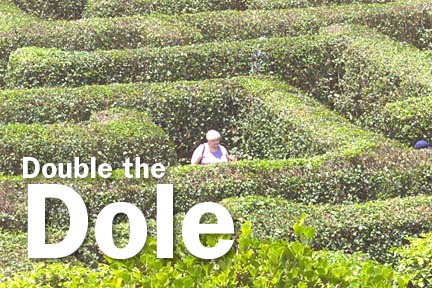
Dole Plantation, home of a two-acre maze, wants to add to its visitor center to include a farmer's market.
STAR-BULLETIN / 2001
The North Shore
plantation aims to grow
The City Planning Commission was to hear a pitch today for a special use permit to expand the Dole Plantation visitor center near Wahiawa, adding retail shops, food and beverage services and a farmer's market.
Castle & Cooke Properties Inc., which owns the 250 acres of land that house the visitor center and other activities, says the new operations will cost about $6 million to complete and will produce 114 new jobs.
The changes would double the existing visitor center by adding a 17,000-square-foot building and other facilities. Products from the diversified agriculture of the area would be processed in front of visitors and sold on-site. A new coffee mill would sell Waialua coffee, Castle & Cooke said.
"It's to promote diversified agriculture on the North Shore, create much-needed jobs for the community and definitely we want to educate the visitors and local residents on the importance of the pineapple industry and diversified agriculture," Susan Harada, operations manager of the Dole Plantation, said yesterday.
She said it is important to show people the place pineapple and sugar once had in island agriculture and how things have changed, with much more diversification.
And it is intended to give tourists a reason to come back to Oahu, she said.
Harada said the new building may sound massive but it isn't really when the fact that everything will be under one roof, including the backup and equipment for landscaping as well as receiving and storage space for retail stores and a restaurant.
The farmer's market would sell produce to visitors and Hawaii residents, showcasing fruits and vegetables from diversified agriculture of North and Central Oahu, Harada said.
The design calls for educational displays showing plantation life and the history of pineapple and sugar as well as newer agricultural products, she said.
The property, between Wahiawa and Haleiwa, has been in agricultural use since the early 1900s. A hundred years ago, Dole Pineapple Co. opened a roadside stall selling pineapples from what was then a 60-acre pineapple plantation.
Aside from the current visitor center, which opened in 1988 looking like an old plantation manager's house, Dole Plantation currently has a botanical garden, a two-mile rain ride showing off pineapple cultivation and the two-acre Pineapple Garden Maze, a complex of hedges picked by the Guinness Book of Records in 2001 as the world's largest maze.
Harada said the changes need a special use permit from the Planning Commission as well as City Council approval of a zoning change to general agriculture from special agriculture.
The zoning change would allow outdoor recreation uses such as wandering the expanded botanical garden, horseback riding and possibly using the property's reservoir for trout fishing and kayaking at some time in the distant future, Harada said.
Construction will start in 2005 if all permits are granted, she said.
